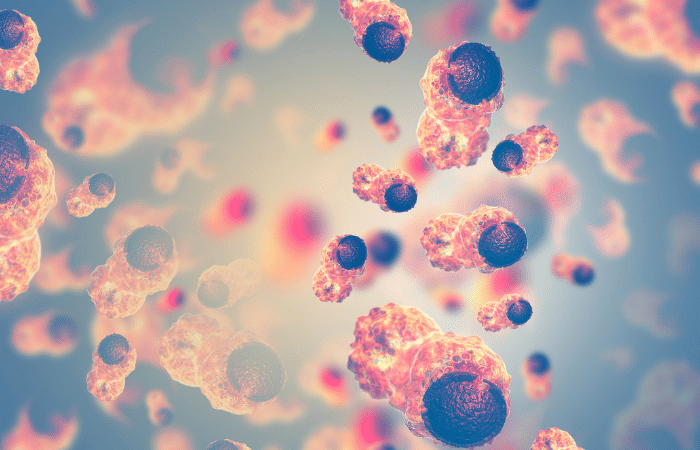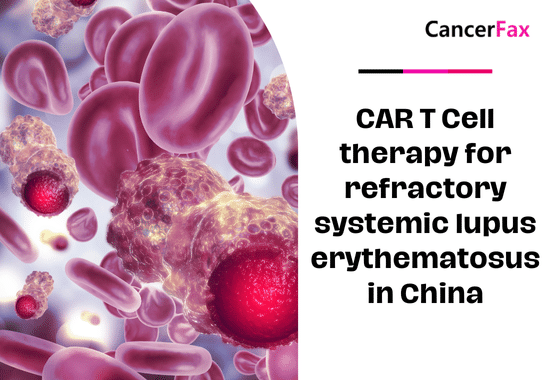What is systemic lupus erythematosus?
Systemic lupus erythematosus (SLE) is defined by an abnormal immune response, resulting in a highly varied clinical presentation that can potentially impact many systems and organs. Although the mortality rate of SLE has significantly decreased due to the use of steroids, certain types of refractory/severe SLE can still lead to chronic organ damage and higher rates of death and morbidity. In addition, people with systemic lupus erythematosus (SLE) who have several comorbidities may encounter a complex medical situation and experience a poor prognosis.
The majority of people with systemic lupus erythematosus (SLE) have remission when treated with immunosuppressive medicines. However, there is a group of patients who do not respond to current treatments and continue to have active disease. The incidence of illness and death caused by active systemic lupus erythematosus (SLE) remains elevated in these people, and the quest for secure and efficient treatments to address this issue is still in progress.
Understanding SLE and need for innovative treatment
SLE is a complex disease that presents with a wide range of symptoms, varying from minor manifestations like joint pain and skin rashes, to more severe conditions such as renal damage, cardiovascular disease, and neurological consequences.
Conventional therapies consist of immunosuppressive medications, corticosteroids, and biologics, which are intended to decrease inflammation and regulate the immune system’s reaction. Nevertheless, these therapies can result in notable adverse reactions and may not consistently produce desired outcomes, especially in situations that are resistant to therapy.
Patients with refractory systemic lupus erythematosus (SLE) frequently experience a bleak outlook, since ongoing disease activity results in progressive organ damage and reduced quality of life. The lack of medicinal solutions for this problem has led to the investigation of new and innovative treatment methods, such as CAR T cell therapy.
This strategy has demonstrated potential in the field of cancer treatment and is currently being studied for its effectiveness in treating autoimmune illnesses.
Background and purpose
CAR T cells have been used to treat types of B cell and plasma cell cancers that are resistant to other treatments. B cells are recognized as significant contributors to systemic lupus erythematosus (SLE). Monoclonal antibodies targeting B cells have been utilized in the treatment of SLE. Nevertheless, these antibodies do not fully eradicate B cells in the tissues. So, we looked into whether CAR T cells that target B cells could effectively kill B cells and cause remission in people with systemic lupus erythematosus (SLE) that does not respond to treatment.

Description
Systemic lupus erythematosus (SLE) is a severe autoimmune disorder that can cause significant harm to various organs and systems, ultimately leading to disability and potentially death. Children diagnosed with systemic lupus erythematosus (SLE) are especially vulnerable to organ damage, particularly in the kidneys. Additionally, they typically experience a more severe and prolonged progression of the disease compared to adults.
At present, the main approach to treating SLE is the use of glucocorticoids and immunosuppressants to relieve symptoms. Nevertheless, as there is no therapeutic remedy available, patients frequently necessitate long-term therapy. Biological therapies like belimumab and rituximab have been recently used to treat SLE.
However, these drugs are unable to fully eradicate autoimmune B cells in the bone marrow, resulting in suboptimal overall results. In addition, discontinuing the use of medications might result in a recurrence of symptoms, and it is important to note that there is currently no known remedy for SLE, so patients must confront the difficulties of long-term medication and an untreatable illness.
Since 2019, CAR-T cell therapy has effectively treated autoimmune disorders. Targeted CD19 CAR-T cells have been shown in clinical studies to offer substantial therapeutic potential for SLE. These cells efficiently inhibit the pathogenic advancement of SLE and can also effectively manage severe instances. Furthermore, using CD19 CAR-T cells that are specifically aimed at SLE patients is expected to not only boost their immune systems but also allow them to stop taking medications for life, avoiding the severe long-term side effects that come with drugs like immunosuppressants and hormones. The purpose of this study is to find out if anti-CD19 CAR-T cells are safe and effective for treating systemic lupus erythematosus (SLE) that starts in childhood and does not respond to other treatments.
CAR T Cell Treatment of Refractory Systemic Lupus Erythematosus
CAR T cells have been used to treat types of B cell and plasma cell cancers that are resistant to other treatments. B cells are recognized as significant contributors to Systemic lupus erythematosus (SLE). Monoclonal antibodies targeting B cells have been employed for the treatment of SLE.
Nevertheless, these antibodies do not fully eliminate B cells in the tissues. So, we looked into whether CAR T cells that target B cells could effectively kill B cells and cause remission in people with systemic lupus erythematosus (SLE) that does not respond to treatment.
Techniques
T cells from peripheral blood apheresis were used to change their genes. This was done with a lentiviral vector that had a chimeric antigen receptor (CAR) targeting CD19. The modification process was performed using the CliniMacs Prodigy system by Miltenyi Biotec. Following the conditioning process, patients were administered a single infusion of 1×106 CD19-CAR-T cells per kilogram of body weight. Prior to the infusion of CAR-T cells, all therapies for systemic lupus erythematosus (SLE) were discontinued.
To check for tolerability, people had to keep an eye out for infections, cytokine-release syndrome (CRS), and CAR T-cell-related encephalopathy syndrome (CRES). For the first test of how well it worked, they looked at whether it led to a Lupus Low Disease Activity State (DORIS remission criteria), seroconversion, and the end of all SLE-specific medicines. Furthermore, BCR sequencing was conducted initially and subsequently following the reappearance of B cells.
Results
Five patients diagnosed with Systemic Lupus Erythematosus (SLE) were treated with Chimeric Antigen Receptor T-cell (CAR-T) therapy. The patients were followed up for different durations: 14 months for patient 1, a 20-year-old female with an SLE Disease Activity Index (SLEDAI-2K) score of 16; 11 months for patient 2, a 22-year-old male with an SLEDAI-2K score of 16; 6 months for patient 3, a 22-year-old female with an SLEDAI-2K score of 10; 5 months for patient 4, a 24-year-old female with an SLEDAI-2K score of 8; and 3 months for patient 5, an 18-year-old female with an SLEDAI-2K score of 9. All patients exhibited severe systemic lupus erythematosus (SLE) with treatment-resistant symptoms.
Additionally, they had proteinuria above 1 g per 24 hours and histological evidence of glomerulonephritis, which indicated active kidney disease. There were no instances of infection or CRES. Following novaminsulfone treatment, three patients experienced a mild cytokine release syndrome (grade I) with fever. In one patient, tocilizumab was also administered.
From day 2, following the administration of CAR-T cells, B cells were entirely missing in the peripheral blood. All of the patients with Systemic Lupus Erythematosus (SLE) went into long-lasting remission without taking any medicine (patients 1–5: SLEDAI-2K=0; patient 2: SLEDAI-2K=2). This met the criteria for Lupus Low Disease Activity State (LLDAS) and DORIS remission in SLE.
The production of anti-dsDNA antibodies was seen, and in the two patients who were monitored for a longer period (patients 1 and 2), the presence of ANA antibodies also disappeared. All five patients abstained from using immunosuppressive medications, including glucocorticoids. B cells reappeared after a mean±SD of 126±48 days without any indication of a sudden increase or reappearance of autoantibodies.
When B cell receptor repertoires were first looked at and then again later, it was found that some clonotypes were less common than they had been before, that BCR clonotypes were spread out evenly, and that IgD and IgM heavy chains were used a lot. These findings indicate a resetting or restarting of the B-cell system.
CAR T Cell therapy breakthroughs in China
China has been leading the way in incorporating CAR T cell therapy into the therapeutic approach for refractory SLE. Groundbreaking clinical trials have shown encouraging effects, with notable enhancements in disease activity and patient outcomes. Researchers at the Second Affiliated Hospital of Zhejiang University conducted a ground-breaking study that provided compelling evidence for the efficacy of CAR T cell therapy in treating systemic lupus erythematosus (SLE).
This trial administered CAR T cell therapy to patients with severe, treatment-resistant systemic lupus erythematosus (SLE). The therapy specifically targeted the CD19 antigen, which is found on B cells. The outcomes were extraordinary: the majority of patients underwent swift and enduring decreases in disease activity, with a few attaining total remission. Along with these results, levels of autoantibodies went down and levels of complement went back up, which shows that the treatment had a big effect on the autoimmune process. Clearly, CAR T Cell therapy in China is leading on this front as compared to the rest of the world.
Challenges and future direction
Although the results show promise, CAR T cell treatment for SLE encounters multiple obstacles. The therapy’s intricacy and expense, along with the possibility of severe adverse effects, and the requirement for specialist medical infrastructure, restrict its widespread implementation. Furthermore, it is necessary to do additional research to assess the treatment’s long-term safety and durability.
An important problem is how to effectively deal with the risk of serious side effects connected to CAR T cell therapy, such as cytokine release syndrome (CRS) and neurotoxicity. Cytokine release syndrome (CRS), a widespread immune response characterized by inflammation, can pose a significant risk to life and necessitate immediate and efficient treatment. Scientists are currently investigating methods to reduce these hazards, such as implementing safety switches in CAR T cells and creating advanced CAR designs.
Furthermore, the manufacturing of CAR T cells is an intricate and laborious procedure, which includes gathering cells from the patient, genetically modifying them, and expanding the cells under strict conditions. Current initiatives are being implemented to simplify and mechanize this procedure in order to enhance the accessibility and cost-efficiency of the therapy.
Conclusion
CAR T cell therapy is a significant breakthrough in treating refractory systemic lupus erythematosus, especially in China, where clinical trials have produced promising outcomes. This novel strategy presents a promising opportunity for those suffering from severe, unresponsive systemic lupus erythematosus (SLE), offering a viable route to achieving disease remission and enhancing their overall quality of life. The best hospitals for CAR T cell therapy in China are conducting clinical trials in this area.
In order to make CAR T cell treatment a feasible choice for a larger number of patients, it is imperative to tackle the obstacles of cost, accessibility, and safety as research advances. In order to fully harness the promise of this groundbreaking therapy and revolutionize the treatment of autoimmune diseases, it is crucial for scientists, physicians, and industry stakeholders to continue collaborating.


